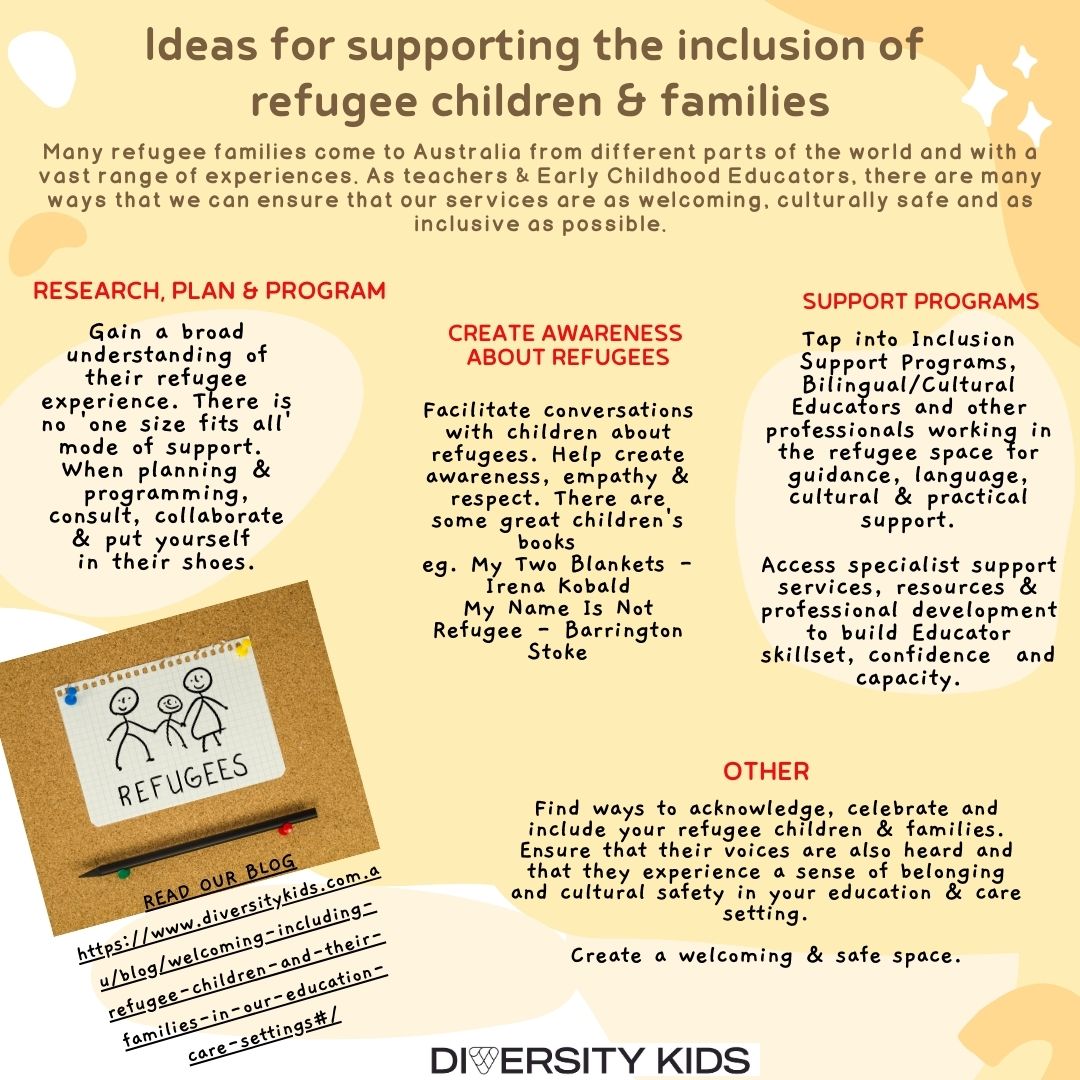|
Cultural Perspectives in Education & Care
Many refugee families come to Australia from different parts of the world, for diverse reasons and with a vast range of experiences. As Teachers and Early Childhood Educators, there are many ways we can ensure that our services and classrooms are well informed about their journey, and readily equipped to offer supportive, welcoming and inclusive environments.
What is the difference between a migrant and a refugee? Migrants make a conscious decision to relocate and, in many instances, have been selected because they have valuable skills to bring to their new country. Refugees however, flee their country for their own safety and usually cannot return unless the situation that forced them to flee improves. Furthermore, refugees have typically been exposed to high levels of trauma and significant periods of severe deprivation prior to their selection for resettlement. Transition to their new life in their new country therefore presents many challenges. Asylum Seekers are those that flee their own country and apply to the government of another country for protection, as refugees. Over the last few years in Australia, the countries of origin of refugees and humanitarian entrants have been Syria, Iraq, Afghanistan, Iran, Myanmar, Bhutan, the Democratic Republic of Congo and recently Ukraine. Over 800,000 refugees and displaced persons have settled in Australia since 1945 (Department of Immigration and Border Protection, 2013-2014). As Teachers and Early Childhood Educators, we can be prepared to receive refugee children & their families, by skilling ourselves up and tailoring our programs and environments to accommodate the unique challenges and sensitivities experienced by the refugee children and families that come through the doors of our education and care settings. Working with and supporting the inclusion of refugee children & families enables practical application of our own cultural competence skills. Treat each child & family as unique with a life story of their own. It is important to think of the journey of every refugee child and their family as unique. There is no ‘one size fits all’ refugee experience and therefore no single mode of support that we can offer. As Educators, we need to be mindful of some of the issues that affect refugee children & families and develop strategies & support mechanisms that are meaningful, authentic and sensitive to their individual needs. For example, some children may be experiencing emotional issues including anxiety, fear or grief. It is highly likely that opportunities for play would have been minimal and that developmental milestones have been delayed. It is also likely that they have experienced trauma and have possibly been exposed to violence and death. One of our Ukrainian Bilingual Educators that is currently supporting the inclusion of a refugee child at her child care centre, reports that the child regularly engages in dramatic play around nursing & providing medical care for her wounded doll. Equally as important is the need for us to be mindful of the problems associated with stereotyping and labelling refugee children and families. We should never assume anything about a refugee child, their family or their situation. From the onset, there is always great value in self and critical reflection around our own personal definition and perception of “refugees and the refugee experience”. There is so much value in unlearning some of our previous learning and dismantling and replacing some of our assumptions with knowledge acquired through real life cultural competence building experiences. We should also endeavour to understand the unique experiences of the children and families that become part of our education and care community. We can best do this through intensive research and planning, demonstrating kindness and empathy and by putting ourselves in their shoes when delivering culturally sensitive programs & support. We can better inform ourselves about their experiences, by having conversations with various agencies that support these families, keeping up to date with current, relevant literature and asking those sensitive but insightful questions of families. Such steps help us develop authentic, meaningful relationships and connections. They also help create an environment where families feel safe to leave their child. What are some useful practical tips & strategies that help facilitate inclusion and welcome of refugee children and families?:
Services that can offer support to refugee children & families: 1. Refugee Council of Australia www.refugeecouncil.org.au Ph: (02) 9211 9333 2. Services for the Treatment And Rehabilitation of Torture and Trauma Survivors (STARTTS) www.startts.org Ph: (02) 9794 1900 3. NSW Refugee Health www.swahs.nsw.gov.au Ph: (02) 8778 0770 4. Settlement Services International www.ssi.org.au Ph: (02) 8799 6700 5. Migrant Resource Centres 6. Asylum Seekers Centre https://asylumseekerscentre.org.au Ph: (02) 9078 1900 Useful resources/books for children: My Two Blankets – Irena Kobald My Name is Not Refugee – Kate Milner Refugees – David Miller What is a Refugee? – Elise Gravel Hello – A Counting Book of Kindnesses – Hollis Kurman References Department of Immigration and Border Protection, 2013-2014 Early Childhood Australia, Every Child, Cultural Considerations – Welcoming Refugee Children & Families Into Our Services, Vol. 22, No. 2, 2016: 8-9
0 Comments
Leave a Reply. |
AuthorMeni Tsambouniaris Archives
March 2024
Categories |
|
|
©Diversity Kids 2023. Designed by BlackRhino Creative.
|


 RSS Feed
RSS Feed